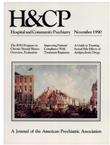Sexual Side Effects of Antipsychotic Medication: Evaluation and Interventions
Abstract
Sexual side effects of antipsychotic medications, which include disturbances of erection and ejaculation, changes in libido, and priapism in men and decreased libido, orgasmic dysfunction, and menstrual irregularities in women, are estimated to occur in 30 to 60 percent of persons taking the drugs. The authors review side effects associated with specific drugs and present guidelines for assessing whether sexual dysfunction is related to medication. Pharmacological interventions that may reduce antipsychotic-induced sexual dysfunction include gradually reducing the dose or changing the type of medication and administering other medications such as bethanchol, neostigmine, cyproheptadine, and bromocriptine that are known to improve sexual dysfunction.
Access content
To read the fulltext, please use one of the options below to sign in or purchase access.- Personal login
- Institutional Login
- Sign in via OpenAthens
- Register for access
-
Please login/register if you wish to pair your device and check access availability.
Not a subscriber?
PsychiatryOnline subscription options offer access to the DSM-5 library, books, journals, CME, and patient resources. This all-in-one virtual library provides psychiatrists and mental health professionals with key resources for diagnosis, treatment, research, and professional development.
Need more help? PsychiatryOnline Customer Service may be reached by emailing [email protected] or by calling 800-368-5777 (in the U.S.) or 703-907-7322 (outside the U.S.).



